新目标七年级下册英语课件
合集下载
新目标(人教)七年级下册英语教学课件 Unit 10 Section A(GF-3d)

七年级英语下(RJ) 教学课件
Unit 10 I'd like some noodles.
Section A (Grammar Focus-3d)
➢ Key words & phrases:
学习目标
meat; what size; what kind of; countable; uncountable.
In our group, Sally and Tom would like some hamburgers. Anna and Jim would like tomato and egg rice. Nobody would like potato salad. ...
Exercises
一、将方框中的单词按照可数名词和不可数名词进行分类并写 出可数名词的复数形式。
What kind of noodles would you like? I’d like beef noodles, please.
What size would you like?
I’d like a large bowl, please.
Would you like a large bowl?
➢To learn to distinguish and use countable and uncountable
nouns about food.
What kind of noodles would you like?
What size would you like?
➢ How to make a dialogue between the waiter and the customer(顾客) ?
2._W__h_a_t_s_iz_e__w_o_u_l_d_y_o_u__l_ik_e_?___________________ (size) _I_’d__li_k_e_a__m__ed__iu_m__b__o_w_l_, _p_le_a_s_e_. ______________ (medium)
Unit 10 I'd like some noodles.
Section A (Grammar Focus-3d)
➢ Key words & phrases:
学习目标
meat; what size; what kind of; countable; uncountable.
In our group, Sally and Tom would like some hamburgers. Anna and Jim would like tomato and egg rice. Nobody would like potato salad. ...
Exercises
一、将方框中的单词按照可数名词和不可数名词进行分类并写 出可数名词的复数形式。
What kind of noodles would you like? I’d like beef noodles, please.
What size would you like?
I’d like a large bowl, please.
Would you like a large bowl?
➢To learn to distinguish and use countable and uncountable
nouns about food.
What kind of noodles would you like?
What size would you like?
➢ How to make a dialogue between the waiter and the customer(顾客) ?
2._W__h_a_t_s_iz_e__w_o_u_l_d_y_o_u__l_ik_e_?___________________ (size) _I_’d__li_k_e_a__m__ed__iu_m__b__o_w_l_, _p_le_a_s_e_. ______________ (medium)
新目标(人教)七年级下册英语教学课件 Unit 9 Section A(2a-2d)
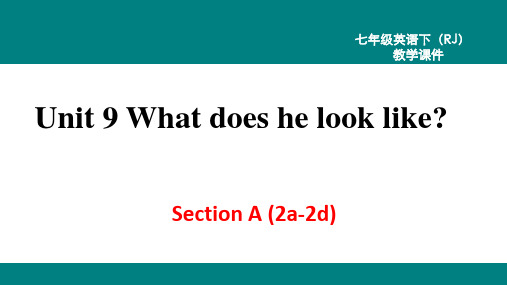
little 表示否定含义, 修饰不可 I have little free time. 我几乎没有空 “几乎没有” 数名词 闲时间。
a little 表示肯定含义, “一点;少量”
I know a little French. 我懂一点儿 法语。
2. He has brown hair and wears glasses. 他有着棕色的头发而且戴着眼镜。 wear 动词, 可表示“戴着眼镜”, “蓄着……样的头发”, “穿着……样的衣服”等。 wear的宾语是“衣服、鞋子、眼镜、首饰”等。 wear 表示经常性的状态。 put on表示穿的动作。
David
Sally
Peter
is heavy of medium height, short tall thin
has curly hair long straight hair short hair
is后多接形容词,用于描述身高、体格等;has后一般接名词短语, 用于描述头发等。
Listen and read. Conversation 1 A: Is that your brother David? B: No, it isn’t. A: What does David look like? Is he tall or short? B: He’s tall. He’s heavy. And he has curly hair.
You ask and I answer
Pre-listening
Look at the picture and I circled one person. Then you can guess which one I circled using these sentences:
新目标(人教)七年级下册英语教学课件 Unit 9 Section B (1a-1e)
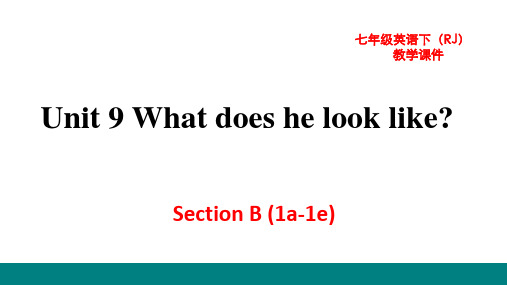
What does Johnny do? What does Johnny look like?
He’s a singer. He’s really tall and thin. He has curly hair. He wears funny glasses.
Ask and answer.
What does Tina do? What does Tina look like?
My favorite sports player is Yi Jianlian. He’s tall and of medium build. He has short black hair. And he also has a long face. He plays basketball very well. I like him very much.
Jackie Chan
Jackie Chan is a famous movie actor. He has a big nose and small eyes. He has short black hair. He doesn’t wear glasses. He can do Chinese kungfu. He is very popular all over the world.
The man in picture d has short straight brown
hair. He has a big nose and small eyes. He
doesn’t wear glasses. He looks funny.
d
Do you know these famous people? Try to describe them.
He’s a singer. He’s really tall and thin. He has curly hair. He wears funny glasses.
Ask and answer.
What does Tina do? What does Tina look like?
My favorite sports player is Yi Jianlian. He’s tall and of medium build. He has short black hair. And he also has a long face. He plays basketball very well. I like him very much.
Jackie Chan
Jackie Chan is a famous movie actor. He has a big nose and small eyes. He has short black hair. He doesn’t wear glasses. He can do Chinese kungfu. He is very popular all over the world.
The man in picture d has short straight brown
hair. He has a big nose and small eyes. He
doesn’t wear glasses. He looks funny.
d
Do you know these famous people? Try to describe them.
新目标(人教)七年级下册英语教学课件 Unit 3 Section A(2a-2e)

Jane: About 15 minutes by bike. It’s good exercise.
/baɪ/ prep. (表示方式)乘(交通工具)
Lisa: Yeah. Well, have a good day at school.
Jane: You, too.
by bike member.
walks
about 20 minutes
takes the bus about one hour and 30 minutes
How far? (kilometers)
about 2 kilometers
about 60 kilometers
2c Listen again. Check your answers in 2b.
Work in groups of four and do a research about others’ transportation, the amount of time and distance to school.
Who How How long
How far
Lily on foot ten minutes one kilometer
这里用作名词, 意为“旅程”。
Lisa: I’m not sure ... about 10 kilometers? The bus ride
takes about 20 minutes. How long does it take you
to get to school?
动词, 意为“花费 (时间)”。
Conversation 1 Mary: How do you get home from school, Tom? Tom: I walk. Mary: How long does it take? Tom: It takes about 20 minutes. Mary: Wow! That’s quick! How far is it from the school to your home? Tom: Only about two kilometers.
新目标(人教)七年级下册英语教学课件 Unit 12 Section A(2a-2d)

/ˈbʌtə(r)flaɪ/ n. 蝴蝶
Lisa: Yeah, it was fun. They have a butterfly house with over 200
visitor /ˈvɪzɪtə(r)/ n. 游客;参观者
kinds of butterflies! I told the visitors about them and their
A: Hi, Mike. What did you do last weekend? B: I watched TV, and then I went fishing
with my father. A: How was your last weekend? B: It was boring.
Names
【用法详解】 sheep是可数名词,意为“羊;绵羊”,其复数形式仍然是sheep。 ➢Sheep are eating grass in the fields. 羊在田野里吃草。
单复数同形的可数名词: 中日鱼羊鹿,是单也是复。
(注:中 — Chinese 日—Japanese 鱼—fish 羊—sheep 鹿—deer)
Listen again and fill in the chart.
Who Becky Carol Jack
Weekend activities visited her grandma, did her homework stayed at home, studied for the English test
Read the sentences in 2a and say the original forms of verbs.
1. ___ I visited my (aunt/ grandma). visit 2. ___ I did (my homework/ sports). do 3. ___ I studied for the (English/ math) test. study 4. ___ I went to a (farm/ beach). go 5. ___ I fed some (sheep/cows). feed
新目标(人教)七年级下册英语教学课件 Unit 9 Section B (2a-2c)
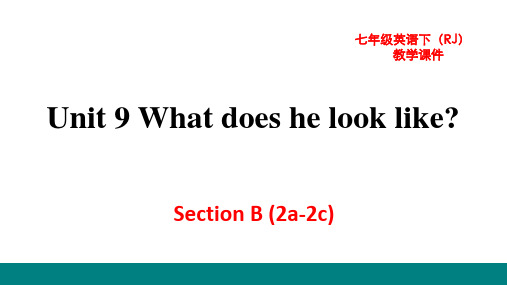
2b Read the article. Which picture shows the real criminal?
2c Read the article again and write what the words in bold refer to.
1.He=___J_o_e__B_r_o_w_n_____________________________ 2.it=____th_e__p_ic_t_u_re__o_f _th_e__c_ri_m_i_n_a_l_________________
七年级英语下(RJ) 教学课件
Unit 9 What does he look like?
Section B (2a-2c)
➢Key words & phrases:
学习目标
artist; crime; criminal; put; each; way; describe; differently; another;
6.He=___th_e__c_ri_m_i_n_a_l____________________________
Language points
1. He wants to draw a good picture of each criminal. 他想画好每 个罪犯的画像。 each adj. & pron. 每个;各自
“The criminal is of medium height and young. He has long
straight brown hair and big eyes,” says one woman. Another
woman says, “He is tall and thin, and he has curly blonde hair.
新目标(人教)七年级下册英语教学课件 Unit 2 Section B(1a-1e)

(在)周末
Student 1 Student 2
Student 3
Name: ____ Name: ____ Name: ____
get up on weekends exercise eat dinner take a shower go to school
Finish the table in 3c and give your report like this.
usually; never. ➢ Key sentences:
1. What time do you get up on school days? 2. Anna never eats breakfast. 3.When do your friends exercise ? ➢To learn to use adverbs of frequency and ask about times.
What time does Rick eat breakfast?
He eats breakfast at seven o’clock.
When does Scott go to work?
He always goes to work at eleven o’clock. He’s never late.
When do your friends exercise? They usually exercise on weekends.
Question 1:when 和 what time 区别
what time和when都是就时间 提问,它们的回答有何异同?
what time问题的回答仅仅为时刻, 而针对when问题的回答还可以是 更加笼统的时间,如: on weekends, in the morning等。
新目标版七年级下册英语教学课件 Unit 3 Section B(3a-Self Check)
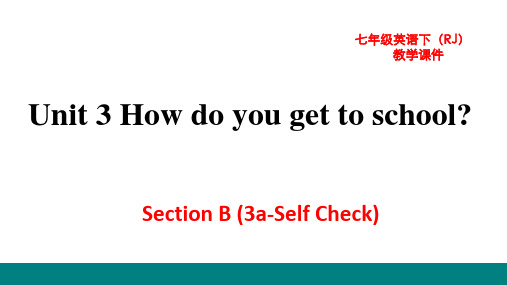
3b Write an e-mail to Tom and tell him how you get to school. These questions may help you.
1. When do you leave home? 2. How do you get to school? 3. How far is it from your home to school? 4. How long does it take you to get to school? 5. Do you like your trip to school?
等)。
上学途中 Tom的感受
What about you? How do you get to school?
Tom
结尾询问对方上学的方式
Read the e-mail again and fill in the chart.
When How How far How long How is the trip
How does he get to school?
It is very _fa_r_ f_r_o_m_ Bob’s home _to_ school.
A: How does … get to school? B: First he/she … to ..., then …, finally…
Tom
Who Tony Mary
Where
from home to school
from home to the library
How by bike by bus
How far 5 km 15 km
How long 20 minutes 40 minutes
新目标(人教)七年级下册英语教学课件 Unit1 Section A(GF-3c)
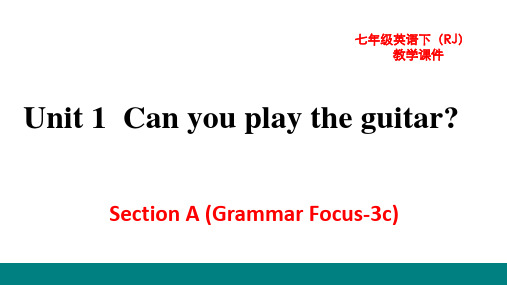
What can you do?
I can dance./I can’t sing.
What club do you want to join? We want to join the chess club.
助动词
实义动词
观察左栏句子,最后一句和前面 的句子有什么不同?
What club do you want to join? 这句话为含有实义动词want的一般现在时的句式结构。
can表“能力”用法 can表示能力时,意为“能;会”。“can+动词原形”表示
“(某人)能/会做某事”,其否定形式为“can’t/cannot+动
词原形”,表示“(某人)不能/不会做某事”。
➢I can play basketball, and my brother can play football. 我会打篮球,我哥哥会踢足球。
否定句
一般疑 问句
He can play the piano. 他会弹钢琴。
主语 + can’t/cannot + 动词原形+其他.
He can’t/cannot play the piano. 他不会弹钢琴。
Can + 主语 + 动词原形 + 其他? 肯定回答:Yes, 主语 + can. 否定回答:No, 主语 + can’t.
Read the poster.
学校(文艺)表演招募学生 show n. 演出;节目 v. 给……看;展示
play sing tell dance
Students Wanted for School Show
We want students for the school show. Can you
Unit1(Section A GF-3c) 课件-七年级英语下册(人教新目标Go for it!)
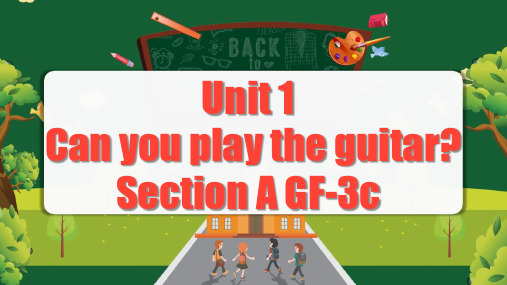
Students Wanted for School Show
We want students for the school show. Can you
______ or ______? Can you ______ the guitar?
Can you _______ stories? Please talk to Mr.
➢表示“请求”或“许可”,意为“ 可以”。
Let’s learn Try to find out the rules.
That can’t be a piano. 那不可能是一架钢琴。 Can the boy be Tom? 这个男孩可能是汤姆吗?
➢表示推测,意为“可能”,常用 于否定句或疑问句中。
2. Jack can _______ stories very well. His stories make us happy.
A. speaks B. tells C. tell D. say
Let’s practice Choose the right answers.
3. — I want to know what you _______ do for the show. — Let me show you my talent.
Let’s have a try!
whatreview Look at the picture and answer the questions.
TTSHHhheeeeycyccaacacnnaannsnpdwslrdaispianmpaylgwaen..ytcahekce.hEgenusgislti.ashr. CCaann yyoouu dsppiwralnaaenigymwac?ke?ct?hEensggsl?uisitha?r?
We want students for the school show. Can you
______ or ______? Can you ______ the guitar?
Can you _______ stories? Please talk to Mr.
➢表示“请求”或“许可”,意为“ 可以”。
Let’s learn Try to find out the rules.
That can’t be a piano. 那不可能是一架钢琴。 Can the boy be Tom? 这个男孩可能是汤姆吗?
➢表示推测,意为“可能”,常用 于否定句或疑问句中。
2. Jack can _______ stories very well. His stories make us happy.
A. speaks B. tells C. tell D. say
Let’s practice Choose the right answers.
3. — I want to know what you _______ do for the show. — Let me show you my talent.
Let’s have a try!
whatreview Look at the picture and answer the questions.
TTSHHhheeeeycyccaacacnnaannsnpdwslrdaispianmpaylgwaen..ytcahekce.hEgenusgislti.ashr. CCaann yyoouu dsppiwralnaaenigymwac?ke?ct?hEensggsl?uisitha?r?
新目标(人教)七年级下册英语教学课件 Unit 2 Section B(2a-2c)

so连接的并列句,前后两个分句之间是因果关系
breakfast, so I usually eat very quickly. For lunch, I usually eat
半小时
hamburgers. After school, I sometimes play basketball for half an hour.
to bed early; eat quickly; play sports; unhealthy; think of.
➢Key sentences:
1. I don't have much time for breakfast, so I usually eat very quickly.
2. After school, I sometimes play basketball for half an hour.
2b
Tony and Mary are brother and sister. They have healthy and unhealthy habits. Who is healthier?
Circle the healthy activities.
Hi! I’m Tony. I don’t like to get up early. In the morning, I get up at eight. Then I go to school at eight thirty. I don’t have much time for breakfast, so I usually eat very quickly. For lunch, I usually eat hamburgers. After school, I sometimes play basketball for half an hour. When I get home, I always do my homework first. In the evening, I either watch TV or play computer games. At ten thirty, I brush my teeth and then I go to bed.
breakfast, so I usually eat very quickly. For lunch, I usually eat
半小时
hamburgers. After school, I sometimes play basketball for half an hour.
to bed early; eat quickly; play sports; unhealthy; think of.
➢Key sentences:
1. I don't have much time for breakfast, so I usually eat very quickly.
2. After school, I sometimes play basketball for half an hour.
2b
Tony and Mary are brother and sister. They have healthy and unhealthy habits. Who is healthier?
Circle the healthy activities.
Hi! I’m Tony. I don’t like to get up early. In the morning, I get up at eight. Then I go to school at eight thirty. I don’t have much time for breakfast, so I usually eat very quickly. For lunch, I usually eat hamburgers. After school, I sometimes play basketball for half an hour. When I get home, I always do my homework first. In the evening, I either watch TV or play computer games. At ten thirty, I brush my teeth and then I go to bed.
新目标(人教)七年级下册英语教学课件 Unit 10 Section A(2a-2d)

—Size M. M码的。
large(大号的);M代 表medium(中号的);
➢ I take size 8 in shoes. 我穿8码鞋。
S代表small(小号的)。
3. One large bowl of beef soup…一份大碗牛肉汤……
large adj. 大号的;大的
【易混辨析】large与big
One large bowl of beef soup, one gongbao chicken, and one mapo tofu with rice. 2. How many bowls of soup would Sally and Tom like to have? One.
3. What size would they like? Large.
What kind of noodles would you like?
I’d like beef noodles, please.
These expressions may help you: what size, would like, I’d like, a large bowl of, what kind of, a medium bowl of, beef, mutton, chicken, tomato, cabbage, potato
1. May I take your order?
2. —What size would you like?
— Large,plesase.
3. We'd also like gongbao chicken and mapo tofu with rice.
➢To learn how to order in a restaurant.
新目标(人教)七年级下册英语教学课件 Unit1 Section A(1a-1c)

dance sing draw swim play chess speak English play the g What can these people do? Match the activities with the
people. 1. sing _e_
Look at the picture and answer the questions.
What can you see in this picture? What clubs can you see?
n. 社团;俱乐部;兴趣小组
Can you Can she Can he
Yes, I can./No, I can’t. Yes, she can./No,she can’t. Yes, he can./No, he can’t.
➢Look! Lily is painting mountains. Jim is drawing a little pig. 看!莉莉正在画山脉,吉姆正在画一头小猪。
2. ①play chess 下国际象棋 ②play the guitar 弹吉他
play作动词的用法
【用法详解】
(1) play与棋牌类或球类名词连用,表示“参加竞技、比赛或球类
A: Yes, I can.
Listen again and answer these questions.
➢ In Conversation 1 What club does the girl want to join? Can she sing? She wants to join the music club. Yes,she can.
play the + 乐器类名词
play the guitar 弹吉他 play the piano 弹钢琴 play the violin 拉小提琴 play the drums 敲鼓
新目标(人教)七年级下册英语教学课件 Unit 6 Section A(GF-3c)
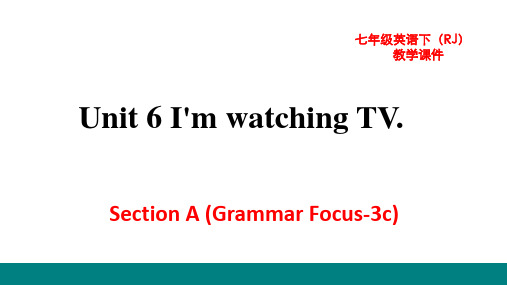
现在进行时
现在进行时表示现在(说话瞬间)正在进行或发生的动 作,也可表示当前一段时间内的活动或现阶段正在 进行的动作。
现在分词的变化规则
规则
一般情况下 直接在动词后面 加-ing 以不发音的字母e结尾的动词, 去掉e,再加-ing 以重读闭音节结尾且末尾只有 一个辅音字母的动词,双写这 个辅音字母再加-ing 以ie结尾的动词,变ie为y,再 加-ing
/təˈmɒrəʊ/adv. 在明天 n. 明天;未来
_5__ Do you want to go tomorrow then?
_8__ OK. See you tomorrow evening! _2__ I’m reading a book. _7__ Let’s go at seven o’clock. _4__ No, this book is really interesting. _1__ What are you doing? _3__ Do you want to go to the movies now? _6__ Sure, what time?
例句 He is riding his bike. 他正在骑自行车。
否定句
主语 + be (am, is, are) + not + v-ing + 其他.
He isn’t reading the newspaper. 他没在 看报纸。
Be (Am, Is, Are) + 主语 + v-ing + 其 —Are they playing soccer? 他们在踢足
喝茶
3. Mary’s parents/drink tea/after dinner __M__a_ry_’_s_p_a_r_e_n_ts_d_r_i_n_k_t_e_a_a_ft_e_r_d_i_n_n_e_r._______
新目标(人教)七年级下册英语教学课件 Unit 6 Section A(2a-2d)
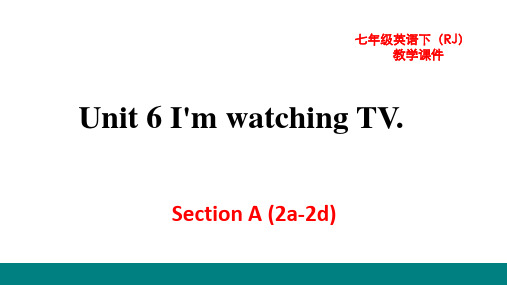
She’s watching TV. 3. What do they want to do?
They want to eat out. 4. What time are they meeting?
They are meeting at half past six.
Language points
1. Hello? This is Jenny. 喂?我是珍妮。 打电话常用语
Jack: That sounds good.
go to the movies 去电影院 = go to the cinema = (go to) see a film
Post-listening
2c Role-play the conversation in 2b.
Jack: Hello, Steve. Steve: Hi, Jack. Jack: What are you doing, Steve? Steve: I’m watching TV. What about you? Jack: I’m listening to a CD, but it’s kind of boring. Steve: Yeah, my TV show is also not very interesting.
【用法详解】“This is ... ”是打电话时介绍自己的常用句型, 意为“我是 ......”。打电话时,一般用 this 代表“我” ,用 that代表“对方”,而不用 I 和 you。询问对方是谁用“ Who’s that?”。 ➢Hello, this is Kate. Who’s that? 你好,我是凯特。你是谁?
(3)“询问对方是谁”的句型: ➢Is that ... (speaking)? 你是……吗? ➢Who’s that (speaking)? 你是谁? (4)其他用语: ➢Hold on, please. 请别挂断。 ➢Wait a moment/minute, please. 请稍等。 ➢Can/May/Should I take a message? 要我记个留言吗?
They want to eat out. 4. What time are they meeting?
They are meeting at half past six.
Language points
1. Hello? This is Jenny. 喂?我是珍妮。 打电话常用语
Jack: That sounds good.
go to the movies 去电影院 = go to the cinema = (go to) see a film
Post-listening
2c Role-play the conversation in 2b.
Jack: Hello, Steve. Steve: Hi, Jack. Jack: What are you doing, Steve? Steve: I’m watching TV. What about you? Jack: I’m listening to a CD, but it’s kind of boring. Steve: Yeah, my TV show is also not very interesting.
【用法详解】“This is ... ”是打电话时介绍自己的常用句型, 意为“我是 ......”。打电话时,一般用 this 代表“我” ,用 that代表“对方”,而不用 I 和 you。询问对方是谁用“ Who’s that?”。 ➢Hello, this is Kate. Who’s that? 你好,我是凯特。你是谁?
(3)“询问对方是谁”的句型: ➢Is that ... (speaking)? 你是……吗? ➢Who’s that (speaking)? 你是谁? (4)其他用语: ➢Hold on, please. 请别挂断。 ➢Wait a moment/minute, please. 请稍等。 ➢Can/May/Should I take a message? 要我记个留言吗?
新目标(人教)七年级下册英语教学课件 Unit1 Section B(1a-1f)
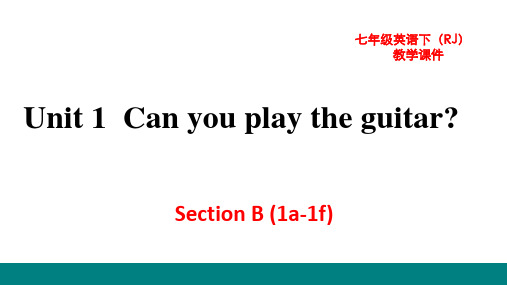
1. A: Can you sing? B: No, I c_a_n_’_t__. But I __ca_n__ play the guitar.
2. A: What can you do? B: I _c_a_n___ sing and I __c_a_n__ play the drums.
3. A: Can you play the piano? B: No, I _c_a_n_’_t _. Frank ___c_a_n___ play the piano.
1d Listen and circle the words and phrases you hear.
play the violin play the guitar play the drums play the piano
sing dance draw tell stories
Listen again and choose.
A. and
B. but
C. or
D. except
2.Frank can play the piano, __D____ he can’t sing ______ dance.
A. and; but
B. but; and C. and; or D. but; or
3.My brother plays _D____ basketball well but he doesn’t play ______
violin; concert. ➢ Key sentences:
1. I want some students for the school concert. 2. What can you do? 3. I can play the piano, but I can't sing or dance. ➢To learn to use modal verb “can” to talk about the musical instruments.
2. A: What can you do? B: I _c_a_n___ sing and I __c_a_n__ play the drums.
3. A: Can you play the piano? B: No, I _c_a_n_’_t _. Frank ___c_a_n___ play the piano.
1d Listen and circle the words and phrases you hear.
play the violin play the guitar play the drums play the piano
sing dance draw tell stories
Listen again and choose.
A. and
B. but
C. or
D. except
2.Frank can play the piano, __D____ he can’t sing ______ dance.
A. and; but
B. but; and C. and; or D. but; or
3.My brother plays _D____ basketball well but he doesn’t play ______
violin; concert. ➢ Key sentences:
1. I want some students for the school concert. 2. What can you do? 3. I can play the piano, but I can't sing or dance. ➢To learn to use modal verb “can” to talk about the musical instruments.
新目标(人教)七年级下册英语教学课件 Unit 3 Section A(1a-1c)

到达
How do you get to school every day?
I _t_a_k_e_t_h_e_b_u_s_ to get to school.
I _ta_k_e__th__e_s_u_b_w_a_y_ to get to school.
Pre-listening
1a Match the words with the pictures.
七年级英语下(RJ) 教学课件
Unit 3 How do you get to school?
Section A (1a-1c)
➢ Key words & phrases:
学习目标
get to; train; bus; subway; take the subway; ride; bike; ride a bike;
How many traffic tools are there in the video?
交通工具
train /treɪn/ n. 火车
bike /baɪk/ n. 自行车
ship
car plane
Can you list other traffic tools?
subway/ˈsʌbweɪ/ n. 地铁
take the train/bus.
➢ Key sentences:
1. —How does Mary get to school?
—She takes the subway.
2. Does Jim walk to school?
3. Look, there they are now!
➢ To talk about how to get to places.
新版新目标英语七年级下unit4--Don't-eat-in-classPPT课件
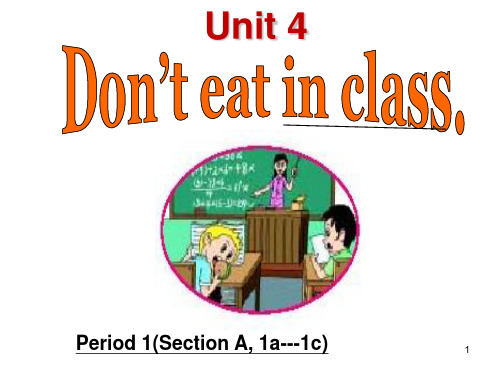
No, we can’t.
Don’t listen to music in class.
.
11
Can you fight in school?No, we can’t.
Don’t fight .
.
12
Words &Expressions on Page 19
• rule n. 规则;规章
• arrive v. 到达
permission. • Get the Ss to know what they can do and what they
can’t do. • Have the Ss learn how to expore sth by group work. • Get the Ss to know wesern culture about schools.
3
4
2. Don’t run in the hallways.
Don’t run in the hallways.
3. Don’t eat in the classroom. You must eat in the dining hall.
4. Don’t listen to music in class.
• ( be )on time 准时
• hall n. 大厅;礼堂
• hallway n. 走廊
• dining hall 餐厅
• listen v. 听;倾听
• listen to... 听.......
• fight v. & n. 打架;战斗
• sorry adj. 抱歉的;难过的;惋惜的
13
Don’t+动词原形+其他.(,please.)
Don’t listen to music in class.
.
11
Can you fight in school?No, we can’t.
Don’t fight .
.
12
Words &Expressions on Page 19
• rule n. 规则;规章
• arrive v. 到达
permission. • Get the Ss to know what they can do and what they
can’t do. • Have the Ss learn how to expore sth by group work. • Get the Ss to know wesern culture about schools.
3
4
2. Don’t run in the hallways.
Don’t run in the hallways.
3. Don’t eat in the classroom. You must eat in the dining hall.
4. Don’t listen to music in class.
• ( be )on time 准时
• hall n. 大厅;礼堂
• hallway n. 走廊
• dining hall 餐厅
• listen v. 听;倾听
• listen to... 听.......
• fight v. & n. 打架;战斗
• sorry adj. 抱歉的;难过的;惋惜的
13
Don’t+动词原形+其他.(,please.)
新目标(人教)七年级下册英语教学课件 Unit 11 Section A(GF-3b)

live → lived like → liked
study → studied carry → carried
stop → stopped plan → planned
【特别提醒】 (1) 在清辅音后,-ed 读/t/。如walked /wɔːkt/, stopped /stɒpt/。 (2) 在元音或浊辅音后,-ed读/d/。如lived /livd/,enjoyed /ɪnˈdʒɔɪd/。 (3) 在/t/和/d/后,-ed读/id/。 如studied /stʌdid/.
/sʌn/n.太阳
Read the letters carefully and answer the questions. (1) Who wrote the first letter?
It was a letter from Jim./Jim did. (2) Why did he write the letter?
Regular verbs
play→played visit→visited climb→climbed study→studied worry→worried stop→stopped
Irregular verbs
do→did is→was are→were have→had eat→ate buy→bought
省略了that的宾语从句
it got very cloudy and we worried it would rain. and连接两个并列分句
worry v.&n. 担心;担忧
【用法详解】 (1) worry在句中作动词,后面可接宾语从句。 ➢ Her parents worry (that) she may be late for school. 她的父
全国优质课一等奖人教新目标英语七年级下册《Unit 1 Section A 2a-2d》课件

1.注意不同名字对应的 不同时刻点。 2.Jim为对话主人公。
My brother Bob takes a shower first at five thirty.
Let’s learn
an interesting job
funny
radio station
radio show
Task 1 Read the conversation in 2d and answer the
Harry: Is he crazy? 疯狂的
Henry: No, he's a barber.
他是一名理发师。 interesting job~
Pre-listening What can you see in the picture?
Jim's family
Someone is taking a shower. And others are waiting. They feel unhappy.
following questions.
1. Does Scott have a boring job?
No, he doesn't. He has an interesting job.
2. Where does Scott work?
He works at a radio station.
3. Is Scott sometimes late for work?
While-listening 2a Listen to the conversation and complete the sentences.
Jim has _t_w_o_ brothers and _t_w_o_ sisters. Jim’s family has __o_n_e____ shower.
- 1、下载文档前请自行甄别文档内容的完整性,平台不提供额外的编辑、内容补充、找答案等附加服务。
- 2、"仅部分预览"的文档,不可在线预览部分如存在完整性等问题,可反馈申请退款(可完整预览的文档不适用该条件!)。
- 3、如文档侵犯您的权益,请联系客服反馈,我们会尽快为您处理(人工客服工作时间:9:00-18:30)。
5. I had a f_____ with Bb esterda.
(二)选择题
( )1.___________late. It’s ur first da t g t schl.
A. Dn’t t be B. Dn’t be C. Dn’t D. NO
( )2. When des the train ____?
学习过程:
Step 1 预习导学
翻译下列短语
1. 上学迟到 ______________ 2. 在走廊里_________________
3. 听音乐 ________________ 4. 在音乐室里_________________
5. 在餐厅里_______________ 6. 穿着运动鞋________________
导语:时间在变,人也在变。有些事,不管我们如何努力,回不去就是回不去了。以下小编为大家介绍新目标七年级下册英语课件文章,欢迎大家阅读参考!
学习目标:
词汇: rule, hallwa, classr, fight, Ms, utside, dining, hall, else, sprts, shes, g
I can’t watch TV n schl nights.
学习过程:
Step 1 预习导学
翻译下列短语
在上学的晚上 太多制度
卧床 放学后 在周末
做晚饭 打扫房间 少年宫 例举自己在家中必须要遵守的规则
________________________________________________________________________________________________________________________________________________________________________________________________
小组内更正1b 2a 2b 的答案
Step 5 拓展创新
用英语把在家中需要遵守的规矩表达出来
________________________________________________________________________________________________________________________________________________________________________________________________
Sectin B
学习目标:
词汇: Dr,wash,later,the Children’s Palace,ludl
短语:t an rules, n schl nights, be in bed, n weeends
句子: I have t be at he b ten ’clc.
3. Please spea l_________ .I can’t hear u.
4. M father n_______ des the cing. Onl des.
5. D u want t ae ur ______ rules?
(三) 根据短文中给出的首字母填空。
小组内更正1a 2a 2b 的答案
Step 5 拓展创新
用英语把在家中需要遵守的规矩表达出来
________________________________________________________________________________________________________________________________
________________________________________________________________________________________________________________________________________________________________________________________________
Step 6 达标检测
(一)根据句意及首字母补全单词
1. Dn’t stand _____. Ce in, please.
2. Dn’t run in the h____.
3. u’d better nt brea the r_____.
4. u dn’t have t wear a u_______ at he.
Step 2 情景导入:
教师吃东西,问学生能否这样做,然后教师示范:
Dn’t eat in class.
Step 3 自主探究
1. 学习P71 1a
2.Listen t 1b and 2a 2b
Step 4 合作交流
小组内学习关于学校规章制度的表达方法
A. arrive B. arrive at C. reach D. arrive in
( )3. Students can’t ____ hats in the classr .
A. put n B. wear C. in D. earing
( )4. ___ she ___ clean the classr tda?
短语:have t, sprts shes, in the hallwas, arrive late fr schl
句子: 1、What are the rules at ur schl?
2、Dn't run in the hallwas and dn't arrive late fr class.
课后反思:
收获:________________________________________________________________
疑问:________________________________________________________________
rule,practice,in,after,luc,fr,n,read,b,earl
Eil has s an 1 .She has t d her hewr at schl.She can’t g ut 2 schl night.She has t wash the dishes 3 dinner,then she can watch TV 4 half an hur.She lies 5 .She usuall reads at night.She has t be in bed 6 ten ’clc because she has t get up 7 the next rning.She 8 a usic club.She has t 9 her guitar ever da.She desn’t thin she’s 10 .
________________________________________________________________________________________________________________________________________________________________________________________________
Dear Dr nw,
It’s nt f un. I have t an r __1_____ in fail. I h __2___ t get up at six ever rning , then I have t practise s _3____ English. I can’t eet friends after schl because I have t w ___4__ dg. O __5___schl nights, I can’t watch TV. And I have t be in bed b __6____ten ’clc . On weeends I have t ____7_ bed and clean r. Then I have t w __8__the dishes. In the afternn, I have t g t the children’s Palace t learn the p ___9_____. I n ___10__have an fun. What can I d?
( )3. Please help e _____ French.
A. speaing B. t speaing C. with spea D. spea
( )4. He ften _____English with the freign teachers.
A. practice spea B. practices spea C. practice speaing D. practices speaing
Step 2 情景导入
教师边说在家中应做的和不应做的边示范 I can’t…/ I can&nt;&nt;&nt;&nt;&nt;
Step 3 自主探究
Listen t 2a 2b
Learn 3a
Step 4 合作交流
小组内学习关于学校规章制度的表达方法
Step6 小结回扣
总结如何表达过去发生的事
描述人物长相
会表达规章制度
Step 7达标检测
(一) 单项选择
( )1. She _________ ediu height ____________ curl hair.
A. Des, has t B. Des, have t C. Des,has D. Des,have
